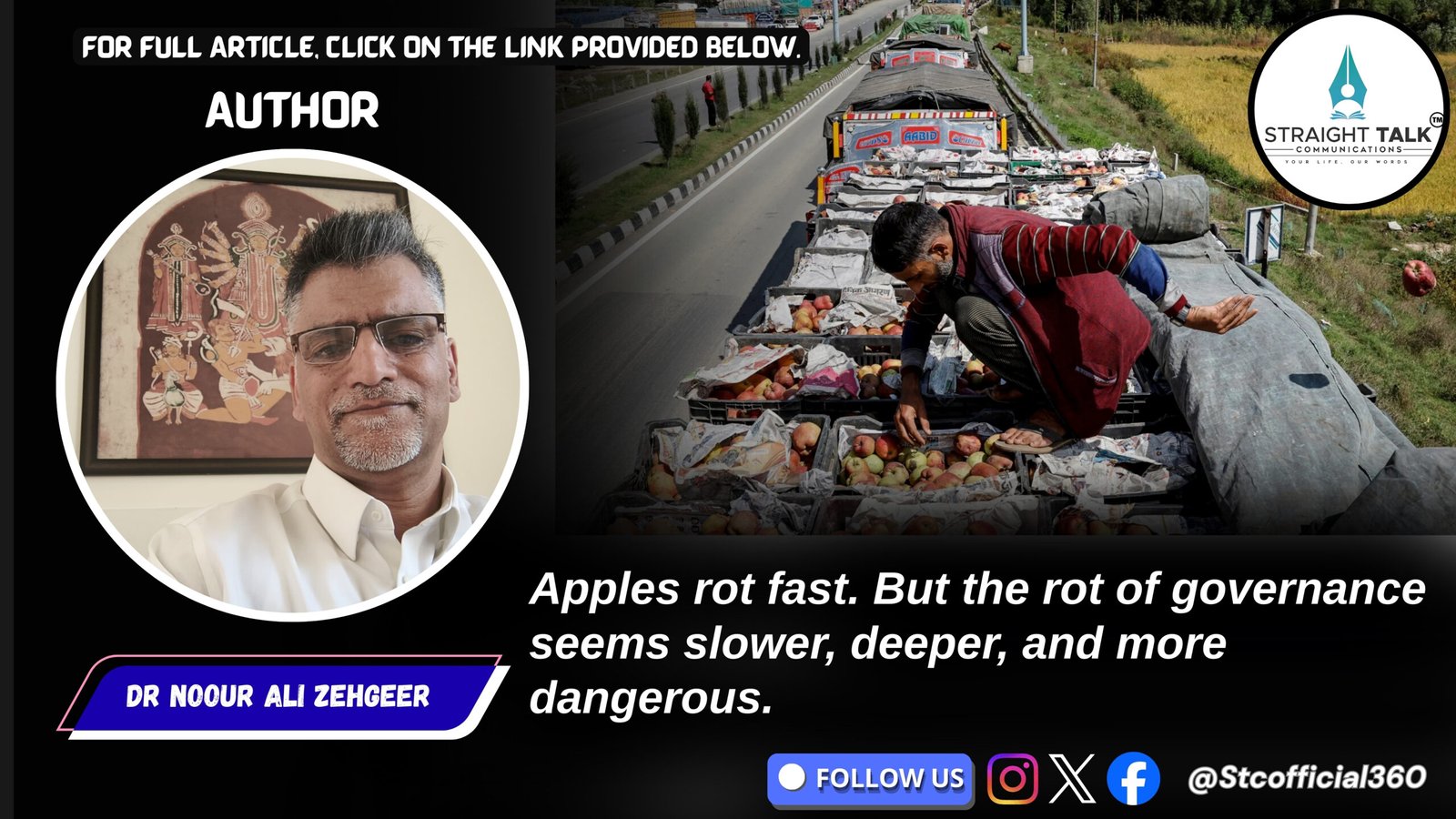The Rotten Highway: When Kashmiri Apple Die on the Road

Apples rot fast. But the rot of governance seems slower, deeper, and more dangerous.
Dr Noour Ali Zehgeer
Kashmir, often romanticized as the orchard of South Asia, greets the world each autumn with a spectacle of crimson and golden apples. These fruits are more than food—they are heritage, survival, and dignity. Yet this year, instead of the sweet scent of harvest, the Valley got engulfed by the sickening odour of decay. Apples, worth crores, were left abandoned on the Srinagar–Jammu highway, trapped in stranded trucks that did not moved for weeks.
This is not the tragedy of a storm, nor the cruelty of nature—it is the slow death caused by human neglect, official apathy, and broken infrastructure.
The farmers who tended orchards from spring blossoms to autumn baskets now stand helpless as their year-long labour dissolves into rot. What should have been a season of hope has become a season of humiliation.
The Beating Heart of a Fragile Economy
Apple farming is not just an occupation in Kashmir—it is the very skeleton of its rural economy. Close to 3.5 million people survive directly or indirectly on this trade. Each wooden crate packed in Sopore, Shopian, or Pulwama represents the sweat of generations, the continuity of tradition, and the only assurance of bread for countless families. From paying school fees to purchasing medicine, from weddings to winter survival, the apple trade sustains everything. But this year, those crates have become coffins of crushed dreams.
A farmer from Pulwama summed it up in despair: “We don’t just see apples rotting, we see our children’s future rotting with them.” When trucks remain still, the flow of life itself freezes. And what happens on the highway echoes back into every Kashmiri home.
A Highway of Abandonment
NH-44, the only lifeline that connects Kashmir’s produce with the rest of India, has once again exposed its fragility. Blocked traffic, endless jams, and poor planning have turned it into a graveyard of trucks and produce.
This is not the first time. Year after year, the same cycle repeats—trucks stranded, apples wasted, farmers ruined—while officials issue statements as stale as the rotting fruit. For decades, promises of alternative routes, modern tunnels, and proper traffic management have been served. But when the crunch arrives, all that remains is silence.
Is it incompetence or indifference? Or worse—a dangerous habit of treating Kashmir’s economy as dispensable?
More Than an Economic Loss
The crisis is not about apples alone. It is about dignity. About the right of a farmer to see his work reach the consumer. About the assurance that labour will be rewarded, not discarded. Every decayed apple is a reminder that those who form the backbone of Kashmir’s economy are being forced to bend under the weight of careless governance.
The collapse also ripples beyond farming. Traders in Sopore mandi, daily-wage labourers who load trucks, transporters who depend on smooth passage—all are caught in the spiral of loss. It is a slow economic suffocation, carried out in broad daylight.
Government in Absentia
Where are the policymakers who proudly claim to champion Kashmir’s development? Where are the ministers who cite “record investments” and “economic revival” in glossy speeches?
It seems they are quick to inaugurate apple festivals in Delhi hotels, but deaf when farmers cry on the roadside. They are present in promotional advertisements, but absent where solutions are needed.
This is not governance—it is abandonment.
The Irony of Celebration Amid Decay
Kashmir’s apples are showcased across India as a symbol of prosperity. They are marketed in Dubai and sold in posh supermarkets in Mumbai and Bengaluru. Yet, the very families who grow these apples cannot afford to buy a kilo of rice when their produce goes to waste.
The irony is unbearable: apples that should have carried pride are now a metaphor for betrayal.
What Needs to Be Done—Yesterday, Not Tomorrow
Sympathy is not enough. Relief packages announced months later are bandages on amputated limbs. What Kashmir requires is structural change, not charity. Alternate Transport Corridors: Reliance on a single road is suicidal for an economy this size. Alternate routes and all-weather connectivity must be non-negotiable. Cold Storage and Processing Units: If modern cold chains existed in sufficient capacity, farmers would not be held hostage to highway traffic.
Accountability in Governance
A yearly disaster cannot be normalized. Those responsible for highway mismanagement must be held answerable.
Immediate Compensation: Families who have lost their produce cannot wait for files to crawl through offices. Direct, fast-track compensation is essential.
Unless such measures are taken, the apple industry—worth thousands of crores—will collapse under the weight of bureaucratic neglect.
A Question That Cannot Be Ignored
If a region’s lifeline can be strangled for days without urgency from the state, what does that say about the seriousness of governance? If farmers who feed millions are left starving, what does that say about the values of this system?
The crisis of 2025 is not an isolated episode—it is a mirror. And the reflection is ugly: a government that boasts of progress while allowing its farmers’ harvest to rot in the open.
Will the Rottenness End?
Apples rot fast. But the rot of governance seems slower, deeper, and more dangerous.
This is not just a story of fruit left to decay—it is the story of a people denied dignity, an economy sabotaged by negligence, and a future trapped on a broken highway. The question remains: will those in power act before the last apple rots, or will they continue to let Kashmir’s backbone crumble silently?
Because when apples rot, hope rots. And when hope rots, rebuilding it takes more than another harvest.







